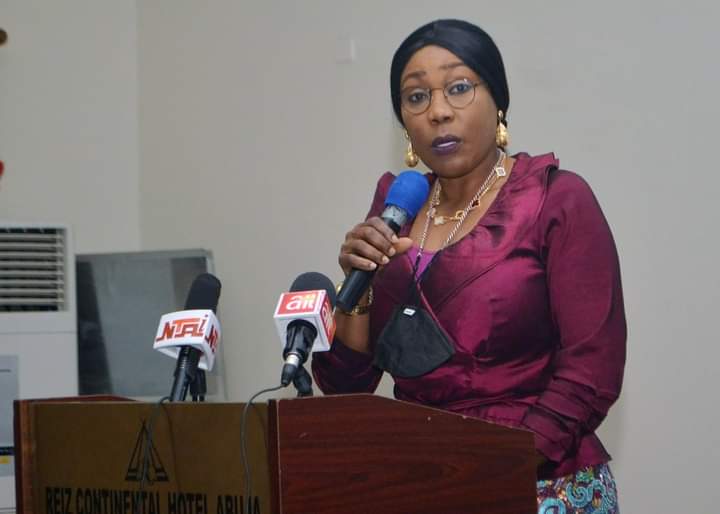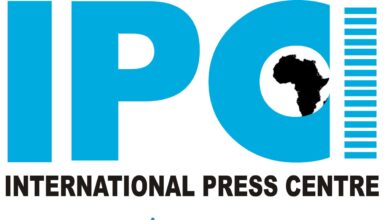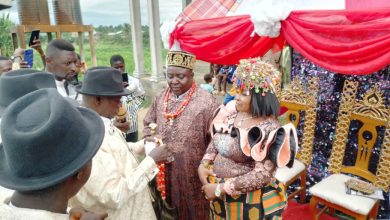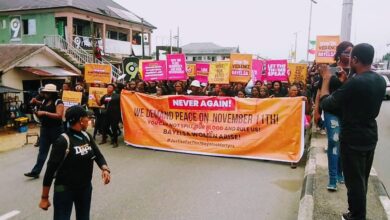NAPTIP Develops National Plan of Action To Tackle Trafficking in Nigeria

NAPTIP Develops National Plan of Action To Tackle Trafficking in Nigeria
The National Agency for the Prohibition of Trafficking In Persons NAPTIP in collaboration with the United Nations Office on Drugs and Crime (UNODC) and the Swiss Government kicked off a new National Plan of Action on Human Trafficking in Nigeria for 2021 to 2025.
In her speech the Director General NAPTIP, Dame Julie Okah-Donli noted that the numerous achievements recorded by the Agency was due to the 2009 to 2012 National Plan of Action, as it provided the much needed framework for a coordinated response to Human Trafficking.
According to her, the successes would have been impossible without the cooperation of stakeholders, including Ministries, Department and Agencies (MDAs) both at the Federal and State levels, as well as donors.
She thanked President Muhammadu Buhari, Hon Minister of Humanitarian Affairs, Disaster Maganement and Social Development, Hajia Sadiya-Umar Farouq, Attorney General of the Federation and Minister of Justice, Abubakar Malami SAN, for their immense support at providing legislations to guide NAPTIP.
She said that baseline assessment of Human Trafficking in Nigeria had been carried out as part of activities towards the development of the new National Plan of Action (NPA).
The DG said after the validation of the final draft of the NPA 2021 to 2025, the document will be presented to the Federal Executive Council (FEC) for approval, as a national policy document that will become a blueprint for all Human Trafficking interventions in Nigeria.
In his speech, the Country Rep of UNODC in Nigeria Mr. Oliver Stolpe, said that the country had taken some necessary steps in recent years to prevent trafficking in persons, raise awareness on crimes around Nigeria, and protection of victims identified both in Nigeria and abroad.
Stolpe particularly congratulated the Director-General for her recent appointment into the board of the UN Voluntary Trust Fund for Victims of Trafficking.
According to her, such appointment serves as an acknowledgment of NAPTIP’s leadership in the fight against trafficking, in Nigeria and beyond.
He, however, called for more efforts from the Nigerian government in spite of the achievements recorded, to enhance the criminal justice response to the issue of trafficking in persons which remains a high profit, low risk crime.
Mr. Manuel Muhlebach, a Migration Adviser, from the Embassy of Swittzerland in Nigeria, noted that trafficking in persons had been a major cause of human insecurity, as it affects the lives of migrants in the most negative ways.
He said that the menace had contributed to the state of fragility by undermining Government authority and capabilities.
According to him, `from Switzerland’s perspective, the fight against Human Trafficking is a key area of intervention to increase human security and that the fight against the menace and the protection of vulnerable migrants constitute important areas of cooperation between Nigeria and Switzerland.
Muhlebach, therefore, called on Nigerian government for inclusion of stakeholders in Human Trafficking policy development, noting that they play a crucial role for this national development.
“In line with our foreign migration policy, as well as our own national action plan against Human Trafficking, Switzerland remains committed to engaging in the fight against Human Trafficking and to working closely with the Nigerian authorities,’’ he said.
Mrs. Mojisola Shodeinde, Head of Office, International Centre for Migration Policy Development (ICMPD), thanked NAPTIP for putting efforts in the fight against trafficking, promising that her organization would continue to work and partner with the agency.
Other stakeholders present were representatives from the British High Commission, International Organization for Migration, UNHCR, A-TIPSOM, Expertise France, WOTCLEF, NACTAL, UN Women, the Nigeria Immigration Service, the Nigeria Security and Civil Defense Corps, The Nigeria Police Force, Fed Ministry of Humanitarian Affairs, Disaster Management and Social development amongst others.





